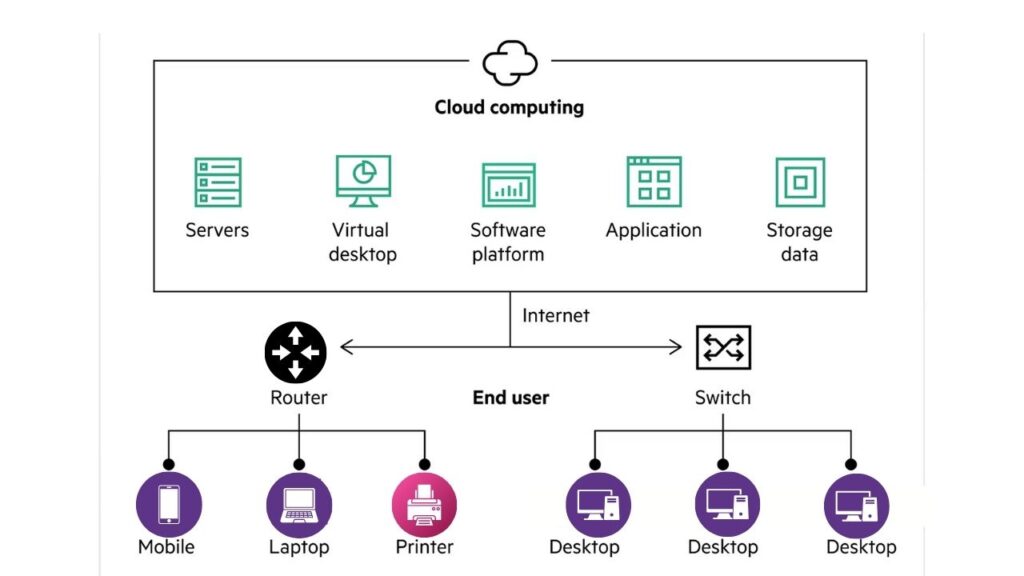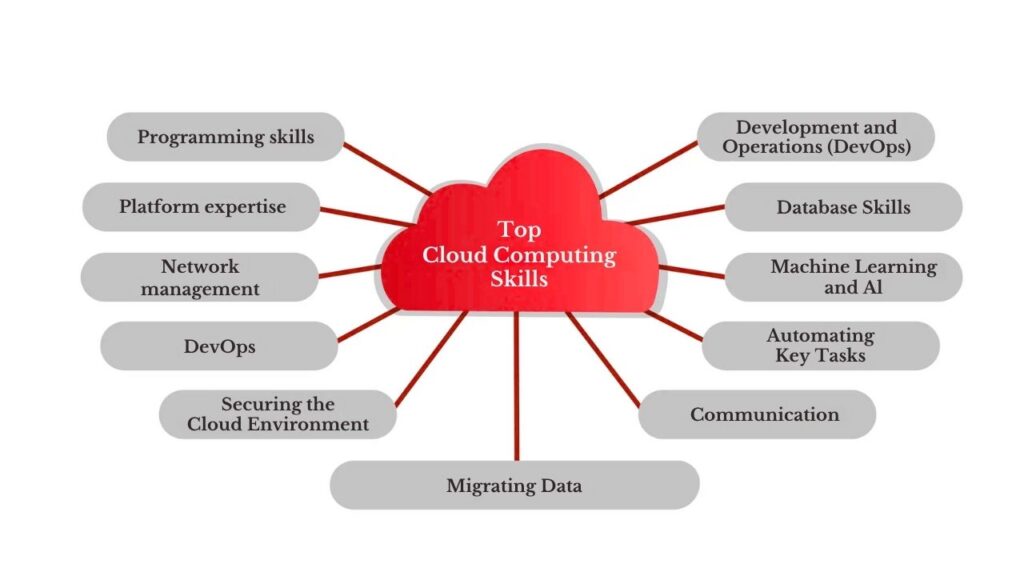In today’s fast-paced digital world, learning cloud computing has emerged as one of the smartest career moves in tech. Cloud computing powers countless services and applications we rely on daily, from streaming our favorite shows to securing sensitive financial information. But what exactly makes cloud computing such a golden ticket for tech professionals, beginners, and career switchers alike? Let’s dive deep into the details, including why the industry is booming, how to get started, and the promising career paths awaiting you.

Table of Contents
What Is Cloud Computing?
At its core, cloud computing means using remote servers hosted on the internet to store, manage, and process data instead of relying solely on your personal computer or local servers. Think of it as renting powerful computers and software online rather than buying and maintaining everything yourself.

Because of its efficiency, scalability, and cost-effectiveness, businesses of every size and sector are moving their operations to the cloud. This shift opens tremendous opportunities for anyone skilled in cloud technologies.
Why Learning Cloud Computing Might Be the Smartest Career Move in Tech Right Now
| Aspect | Details |
|---|---|
| Market Size (2025) | Estimated $723.4 billion in global public cloud spending |
| Growth Rate | 20.4% compound annual growth rate (CAGR) expected through 2030 |
| Job Demand Growth | 25% projected increase in cloud skill demand |
| Top Salaries | Lead Cloud Architects earn up to $182,857 annually |
| Common Roles | Cloud Engineer, Cloud Architect, DevOps Engineer, Cloud Security Engineer, Cloud Developer |
| Certification Penetration | 70% of IT professionals expected to hold cloud certifications by 2025 |
| Cloud Adoption | 98% of organizations use or plan to use multiple cloud providers |
| Remote Work | 30% increase due to cloud technologies enabling flexible work models |
| Official Resource | Amazon Web Services (AWS) Cloud Careers Page |
Learning cloud computing today places you at the forefront of the technology industry, offering high salaries, diverse opportunities, and strong job security. With cloud adoption soaring globally and new technologies like AI increasingly hosted on the cloud, mastering these skills unlocks exciting career paths—from engineering and architecture to security and data science.
The accessibility of certifications, free learning resources, and versatile roles make cloud computing a future-proof career choice adaptable to evolving technologies. Whether you are starting a new career or enhancing your tech skillset, cloud computing empowers you to grow professionally and thrive in tomorrow’s digital world.
Why Cloud Computing Is a Smart Career Move
1. Massive Industry Demand and Market Growth
Cloud computing is one of the fastest-growing technology sectors. By 2025, global spending on public cloud services is projected to reach $723.4 billion, with sustained growth expected for years to come. Organizations across industries like healthcare, finance, retail, and entertainment increasingly depend on cloud technologies for their critical operations.
This growing reliance means the demand for skilled cloud professionals continues to surge, presenting plentiful job opportunities worldwide.
2. High and Competitive Salaries
Cloud computing roles often come with lucrative pay reflecting their importance:
- Lead Cloud Architects can earn upwards of $180,000 annually.
- Starting cloud engineers typically make between $90,000 and $140,000.
- Specialized roles like DevOps engineers, cloud security experts, and cloud data engineers are also well compensated.
Salaries may vary by location but consistently show strong upward trends due to the industry momentum.
3. Career Versatility and Growth Pathways
Cloud skills are versatile and highly transferable across industries. Whether you start as a Junior Cloud Engineer or a Cloud Developer, you can progress to senior and leadership roles such as Cloud Architect, DevOps Engineer, or Cloud Security Specialist. Furthermore, cloud expertise intersects with emerging fields like artificial intelligence (AI), big data, Internet of Things (IoT), and edge computing.
This versatility makes cloud computing a solid foundation for a wide array of tech careers.
4. Remote Work and Flexibility
Cloud computing naturally supports remote and hybrid work models because cloud services are accessible from anywhere with an internet connection. This flexibility expands geographic job markets and allows professionals to design work situations that fit their lifestyles.
5. Accessibility Through Certifications and Learning Resources
You don’t need to be a tech wizard to begin learning cloud computing. Major cloud providers offer certification programs tailored to different experience levels, such as:
- AWS Certified Solutions Architect – Associate
- Microsoft Certified: Azure Fundamentals
- Google Associate Cloud Engineer
These certifications validate your skills, making you more attractive to employers globally.
Additionally, numerous free and affordable online courses, bootcamps, and university programs help newcomers and professionals alike enter and grow in this field.
A Detailed Guide to Starting Your Cloud Computing Career

Step 1: Understand the Cloud Basics
Begin by building a foundation in cloud fundamentals:
- What is cloud computing and why it matters
- Differences between public, private, and hybrid clouds
- Cloud service models: Infrastructure as a Service (IaaS), Platform as a Service (PaaS), Software as a Service (SaaS)
Official resources from AWS, Azure, and Google Cloud offer beginner-friendly tutorials and documentation.
Step 2: Choose Your Cloud Provider and Certification Path
Decide on a cloud platform to specialize in based on your interests, career goals, and regional job demand. Popular certifications include:
- AWS Certified Solutions Architect – Associate (Amazon Web Services)
- Microsoft Certified: Azure Fundamentals
- Google Associate Cloud Engineer
Select a certification that aligns with your desired career path and study accordingly.
Step 3: Gain Hands-On Experience
Practical experience is essential. Leverage free-tier access on cloud platforms to experiment with:
- Cloud storage and databases
- Virtual machines and containers
- Networking and security configurations
Create small projects such as hosting websites or deploying applications to deepen your understanding.
Step 4: Explore Specialized Roles
As you develop, you can specialize in roles such as:
- Cloud Architect: Designs the overall cloud strategy and infrastructure.
- DevOps Engineer: Automates and streamlines software development and deployment.
- Cloud Security Engineer: Protects cloud environments against threats.
- Data Engineer: Manages big data processing on cloud platforms.
Identify roles that interest you and pursue corresponding certifications and projects.
Step 5: Stay Updated and Network
Technology evolves fast, especially in cloud computing. Stay current by:
- Following industry blogs and news sites
- Joining webinars and conferences
- Engaging with cloud professional communities on social networks
Networking connects you with mentors, job opportunities, and keeps you informed of emerging trends.
Practical Tips for Success in Cloud Computing
- Learn Linux and networking basics, foundational for cloud environments.
- Practice scripting and coding in languages like Python, Bash, or PowerShell to automate tasks.
- Understand cloud security principles, a top priority for employers.
- Earn multiple certifications over time to enhance your résumé.
- Contribute to open-source projects or participate in hackathons to showcase skills.
Meta Escalates AI Talent War With OpenAI: The Battle for the Smartest Minds in 2025
FAQs About Why Learning Cloud Computing Might Be the Smartest Career Move in Tech Right Now
What is the future outlook for cloud computing jobs?
Cloud roles are projected to grow by about 25% or more by 2025, far above average for tech jobs. This growth is driven by the expanding use of cloud for digital transformation, AI, and data workloads.
Can beginners break into cloud computing without prior IT experience?
Absolutely. Beginner-friendly certifications and learning paths exist, and many professionals start with a basic understanding of computers and build up their skills systematically.
How long does it take to become cloud certified?
Entry-level certifications can be earned in a few months with consistent study and hands-on practice, enabling you to apply for junior cloud roles soon afterward.
Which cloud provider is best to learn first?
AWS currently dominates the market with the most extensive offerings, making it a practical entry point. However, Microsoft Azure and Google Cloud are strong competitors, especially in certain industries or regions.
Are cloud computing jobs remote-friendly?
Nearly all cloud positions support remote or hybrid setups due to the nature of cloud technology accessibility. This flexibility is a significant advantage of cloud careers.



















